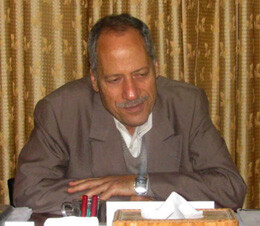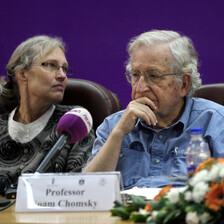The Electronic Intifada 18 March 2010

Saleh Zeidan (Rami Almeghari)
Rami Almeghari: How do you view the Arab states’ support for indirect talks between Israelis and Palestinians in the context of recent developments on the ground, including Israeli policy in occupied East Jerusalem?
Saleh Zeidan: The invitation for indirect peace talks is not something useful, especially given continued Israeli settlement building and the Israeli blockade on Gaza. We have learned throughout past experiences with peace negotiations that such peace talks are taken as a cover by the Israeli occupation government to continue actions on the ground, including judaizing Jerusalem and violating Muslim and Christian religious rights as well as continuing the siege on Gaza.
Also, such talks are not guaranteed by the United States, so such talks will be deadlocked. Among the guarantees requested by Palestinian Authority (PA) President Mahmoud Abbas, is that such talks should involve basic Palestinian issues such as the refugees, borders, security. Yet Israel insists on tackling some minor issues, like removing some roadblocks, transferring of some of [Oslo-decreed] areas A or B in the West Bank to Palestinian control. These issues should not be part of the peace talks, they are rather part of Israeli’s obligations on the ground.
In case such expected talks reach a deadlock, the American mediator does not offer any guarantees for the talks to succeed.
RA: The PA has said that any future Palestinian state shall be based on the pre-1967 occupation border lines of the West Bank and Gaza Strip. Yet, Israel has already preempted the PA’s demand by declaring it would preserve some parts of the Occupied Palestinian Territories for alleged security considerations. How do you see the predicted indirect talks?
SZ: The main problem that you have just mentioned lies in the fact that the peace talks between the two sides do not have a timeline, nor are they backed by American guarantees or actions in case Israel remains intransigent. For example, Israeli Foreign Minister Avigdor Liberman has recently hinted at the possibility that future peace talks would last 18 years more. Therefore, how could these talks bear fruit?
For the past 18 years, there have been so many Israeli measures on the ground like judaizing Arab East Jerusalem. All Israeli actions are meant to prevent realization of a viable, contiguous Palestinian state. So far, the Israelis have not recognized Palestinian rights to sovereignty over the occupied territories of 1967. Israelis only want to impose a de facto solution that meets Israeli settlement purposes in the Palestinian territories.
RA: Since the Annapolis peace conference in late 2008 sponsored by the George W. Bush Administration, Washington has been making relentless efforts for peace between the two sides. How do you see such efforts up to date?
SZ: There was the speech by US President Barak Obama in Cairo last June in which he compared the trauma of the Palestinian people with the Israeli Holocaust in Europe. President Obama asserted that stopping Israeli settlement activities is an imperative for the negotiations to resume. Yet, the beautiful words of Obama have been in retreat for the past period, as Washington has not so far backed such words by real actions on the ground. The Israeli Prime Minister [Benjamin Netanyahu’s] declaration that he would stop settlement building temporarily [for 10 months] has been a fake one, as such a declaration excluded Jerusalem, as well as 3,000 settlement units already approved and infrastructure for the existing settlements.
So, we believe that Washington’s efforts are not enough. We believe that the Palestinian question is no longer a top priority for Washington. This can be attributed to immense pressure by the Zionist Lobby in the US and an untenable peace camp in the region. Therefore, we look forward to a new Arab stance that would make Washington take a fair stance towards the peace process.
We want a fair balanced US position that would make it possible to reach a solution, based on international legitimacy.
RA: There are terms of reference for the peace process. What are the main basis from which Israel has repudiated and how can Washington make Israel comply?
SZ: Israel has never complied with international legitimacy or UN resolutions, for example, UN General Assembly Resolution 194 that guarantees the return of Palestinian refugees. What is needed is that Israel should commit to international law and legitimacy. For instance, the International Court of Justice in the Hague has ruled that the Israeli apartheid wall [in the West Bank] is illegal, but Israel has [ignored this].
A more recent example is the UN-commissioned Goldstone report on Israeli crimes in Gaza in 2009. Israel so far has not admitted committing any human rights violations
RA: Israel has been claiming that Palestinians have not fulfilled their obligations under the US-brokered Road Map.
SZ: I would like to point out the fact that all Palestinian resistance factions have agreed to a mutual calm between the two sides. For instance, after 2003, the number of those killed among the Palestinians has been much larger than the number of those killed at the Israeli side.
RA: In the last Israeli war on Gaza, Israel claimed that Hamas was responsible for the war it waged against the Gaza Strip, mainly the rocket fire from Gaza into Israel.
SZ: Because of the that war, [more than 1,400] Palestinians were killed, more than half were women and children. On the other side, 13 Israelis including four [soldiers] by so-called friendly fire, were killed in that war. I believe what the Israelis are doing is meant to send a message of continuous threat to the Palestinian people.
All Palestinian resistance factions agreed to a mutual ceasefire on the ground, a ceasefire that would not give Israel more excuses to attack the Palestinians. Yet, Israel continues to attack the Gaza Strip and the West Bank. The last Israeli massive aggression of 2009 did not only target the Hamas party, but also the entire Palestinian people. For example, Israel has recently targeted Muslim and Christian holy sites. Therefore, a third intifada is likely, but this requires internal Palestinian unity. We in the DFLP find the continuous Israeli aggression as a fuel for more resistance, including all forms, against the occupation army.
We are a people that need a real and just peace that is based on international legitimacy.
RA: Do you think that directing Arab funds in the US the way the Zionist Lobby is influencing Washington’s decision-making would make a difference?
SZ: There needs to be real Arab action towards sorting out the political situation between us and the Israelis. Such an action could include calling for a UN Security Council meeting, but if the US vetoes a given just resolution by the Security Council, the Arabs should have their say very strongly.
Secondly, the Arabs should deal with the US on basis of mutual interests, such as the oil and trade between the US and the Arabs. We just demand a fair American stance. To reach this end, the Arabs should have a clear position for protecting the holy Arab city of Jerusalem. And finally Arabs should back a Palestinian unity [government] that would enable the Palestinians to restore their legitimate rights.
RA: What would you like to say to the American public?
SZ: We respect the American public, we respect the American democratic values. We expect the American public to further pay attention to the Palestinian cause. We see that the interest of the American public lies in a fair US policy that is not biased towards Israel.
I want to tell our sisters and brothers in the US that the Palestinian people have been going through repression. Such a repression should come to an end. The Palestinian people have been longing for freedom for the past six decades. It is time for the Palestinian people to enjoy a real peace and democratic values as other nations around the globe, including the American nation.
Rami Almeghari is a journalist and university lecturer based in the Gaza Strip.





